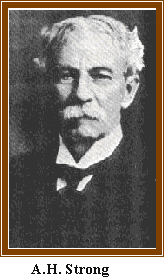A Quote by Augustus Hopkins Strong
It may be doubted whether any repentance is genuine which is not repentance for sin rather than sins
Related Quotes
Repentance is being sorry enough to quit your sin. You will never know the forgiving mercy of God while you are still wedded to your sins. Repentance is the soul's divorce from sin, but it will always be joined to faithRepentance that is not joined to faith is a legalistic repentanceProfessed faith that is not joined to repentance is a spurious faith, for true faith is faith in Christ to save me not in but from my sin. Repentance and faith are inseparable, and 'unless you repent you will all likewise perish' (Luke 13:3).
There are many ways to cover up our sin. We may justify or minimize it by blaming circumstances and others people. However, real repentance first admits sin as sin and takes full responsibility. True confession and repentance begins when blame shifting ends...Just as real repentance begins only where blame shifting ends, so it also begins where self-pity ends, and we start to turn from our sin out of love for God rather than mere self-interest.
The saved sinner is prostrate in adoration, lost in wonder and praise. He knows repentance is not what we do in order to earn forgiveness; it is what we do because we have been forgiven. It serves as an expression of gratitude rather than an effort to earn forgiveness. Thus the sequence of forgiveness and then repentance, rather than repentance and then forgiveness, is crucial for understanding the gospel of grace.
Be ashamed when you sin, don't be ashamed when you repent [To repent means to have a change of heart and mind. It is not simply a feeling of sorrow ,but a psycho/spiritual growth away from evil/death and a turning to God/life]. Sin is the wound, repentance is the medicine. Sin is followed by shame; repentance is followed by boldness [ Boldness means to beg God for undeserved mercy]. Satan has overturned this order and given boldness to sin and shame to repentance.
The solution to staying on the right side of the fine line between using and abusing grace is repentance. The road to repentance is godly sorrow (2 Corinthians 7:10). Godly sorrow is developed when we focus on the true nature of sin as an offense against God rather than something that makes us feel guilty.
There are still people who insist that we have to preach on repentance. Well, I disagree! I think we should do it God’s way – preach the goodness of God and allow the goodness of God to lead people to repentance. Such repentance will be true repentance. It will not be motivated by the fear of judgment and indignation. It will be a genuine repentance that is motivated by His grace, unconditional love and compassion. After all, our ability to love God stems from our first tasting His love for us.
The poor quality of Christian that grows out of our modern evangelistic meeting may be accounted for by the absence of real repentance accompanying the initial spiritual experience of the converts. And the absence of repentance is the result of an inadequate view of sin and sinfulness held by those who present themselves in the inquiry room.
Through repentance the filth of our foul actions is washed away. After this, we participate in the Holy Spirit, not automatically, but according to the faith, humility and inner disposition of the repentance in which our soul is engaged. For this reason it is good to repent each day as the act of repentance is unending.
True repentance is no light matter. It is a thorough change of heart about sin, a change showing itself in godly sorrow and humiliation - in heartfelt confession before the throne of grace - in a complete breaking off from sinful habits, and an abiding hatred of all sin. Such repentance is the inseparable companion of saving faith in Christ.
... the people who, in spite of the bonds of sin which fetter them and hinder them (by constraint and by inciting them to new sins), come to Him, our Savior, with perfect repentance for tormenting Him, who despise all the strength of the fetters of sin and force themselves to break their bonds ? such people at last actually appear before the face of God made whiter than snow by His grace. 'Come, says the Lord: Though your sins be as scarlet, I will make them whiter than snow' (Isa. 1:18).
Repentance is powerful spiritual medicine. There are few spiritual ills it will not cure. Each sin we leave behind through our faith in the living Christ-both those of commission and those of omission-opens spiritual doors. As we feel the potency of repentance, we better understand why Christ admonished the early missionaries of this dispensation to "say nothing but repentance unto this generation."






































